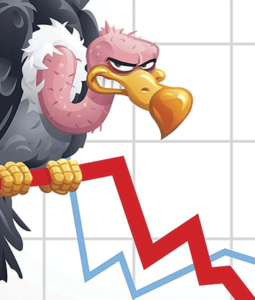OPINION: How ‘regulatory inertia and corporate greed’ have ‘financialized’ American life
By ALEX HENDERSON

Sen. Bernie Sanders of Vermont, during his presidential campaigns of 2016 and 2020, called for a lot more regulation of Wall Street and the financial sector — including private equity firms. And Sen. Elizabeth Warren of Massachusetts has had a lot to say on the subject as well, arguing that private equity firms have become much too powerful.
Such firms have been around for a long time, but they have grown in prominence in recent decades. Journalist Hannah Levintova discusses this topic in an in-depth article published in Mother Jones’ May/June issue and on its website as well. Levintova observes that “investment firms that execute buyouts” have “expanded their grip on ever more pieces of civic life,” and she views that “grip” as incredibly negative.
FINANCIAL ENGINEERING
“Buoyed by LBOs and other forms of financial engineering,” Levintova explains, “they have come to be known as ‘private equity’ because they invest in transactions that are walled off from the public markets. In just a few decades, they’ve bought up everything from dental offices to international call centers to Taylor Swift’s sorrowful ballads and mined them all for profit.”
Levintova adds, “Private equity’s favored methods for taking over companies have been back in the news this spring, thanks to Elon Musk’s $44 billion LBO of Twitter, where Musk has himself played the role of a private equity firm, securing billions in debt that he plans to load onto the social media company.”
According to Levintova, even the COVID-19 pandemic hasn’t slowed down the growth of private equity firms.
FINANCIALIZING THE BASICS OF AMERICAN LIVES
“In 2020,” Levintova observes, “the private equity sector generated about $1.4 trillion — about 6.5 percent of the United States’ GDP, and a jump from two years prior, when it was five percent of GDP. Private equity firms also managed $7.3 trillion in assets in 2020 — roughly the value of Apple, Microsoft, Amazon, and Tesla combined. Nearly 12 million workers — one in every 14 employees in the United States — collect paychecks from companies run by private equity.”
Private equity firms, Levintova warns, have been able to “financialize the basics of Americans’ lives.”
“While reporting for this package,” the Mother Jones reporter notes, “I heard from friends and colleagues who’ve eyed the new private equity owners of their doctor’s office, their fertility clinic, or their apartment building with a mix of skepticism and fear. I got a letter informing me that the electric and gas provider in my home state of Rhode Island — a local, independent company — was about to be purchased by a company heavily invested with a private equity fund based in Manhattan.”
REGULATORY INERTIA, CORPORATE GREED
Levintova blames a “toxic soup of regulatory inertia and corporate greed” for the growth of private equity firms.
“In the popular imagination, private equity is often portrayed as a vulture, or some other scavenger that feasts on the sick and dying — gross but unavoidable,” Levintova explains. “But the bulk of the work done by modern-day private equity firms is not to finish off sick companies, but rather to stalk and gut the healthy ones. This type of predation is the result of 50 years of policies that have prioritized the profit-making of a few over the well-being of many.”
THE GHOST OF MILTON FRIEDMAN
Levintova argues that the late right-wing economist Milton Friedman deserves some of the blame for the predatory practices of private equity firms. Friedman was the godfather of what is known as “shareholder economics,” which argues that companies are under no obligation to worry about the good of society — their only obligation is to their shareholders. Liberal economists like Robert Reich, former Secretary of Labor in the Clinton Administration, and New York Times columnist Paul Krugman have been major critics of Friedman and the Chicago school of economics.
“For a long time,” Levintova writes, “corporations worked in the plain way that you’d imagine they should work: They created a product or provided a service, and if they did a good job of it, they turned a profit…. Simple enough. But a confluence of factors in the 1970s flipped that model on its head. Suddenly, the value of a business was measured less by how well it served its customers, and far more by the profits it reaped for its investors. University of Chicago economist Milton Friedman helped propel this change with a 1970 manifesto in the New York Times.”
PROSPERING FROM ECONOMIC HARDSHIP
Private equity, according to Levintova, have prospered from the economic hardship of others —first during the early 2000s recession, then during the Great Recession of the late 2000s/early 2010s. After the financial meltdown of 2008, she laments, private equity firms experienced “explosive growth.”
“In the last decade, private equity has taken control of more than 80 retailers, leading to the loss of 1.3 million jobs,” Levintova notes. “A firm named for the Ayn Rand character Howard Roark has bought up so many restaurants that it now employs nearly one million fast-food workers nationwide, all while successfully lobbying Congress to kill legislation mandating a $15 minimum wage.”
Levintova continues, “Private equity incursions into real estate have left no form of housing unscathed, driving up the costs of both owning and renting any type of house or apartment or mobile home. They’ve bought up for-profit colleges, driving down graduation rates while increasing student debt. They’ve sought gains in the obscure crevices of our mutual existence, from contact lenses to port-a-potties to ketchup. And they’ve enveloped the health care sector, including hospitals, dermatologists, ophthalmologists, veterinarians, hospice care, and nursing homes, often leading to increased medical costs for patients and a drop in the quality of care.”
(Alex Henderson is a freelance journalist who covers politics as well as arts and entertainment. His work has appeared in Salon, AlterNet, Raw Story, L.A. Weekly and elsewhere.)


Leave a Reply